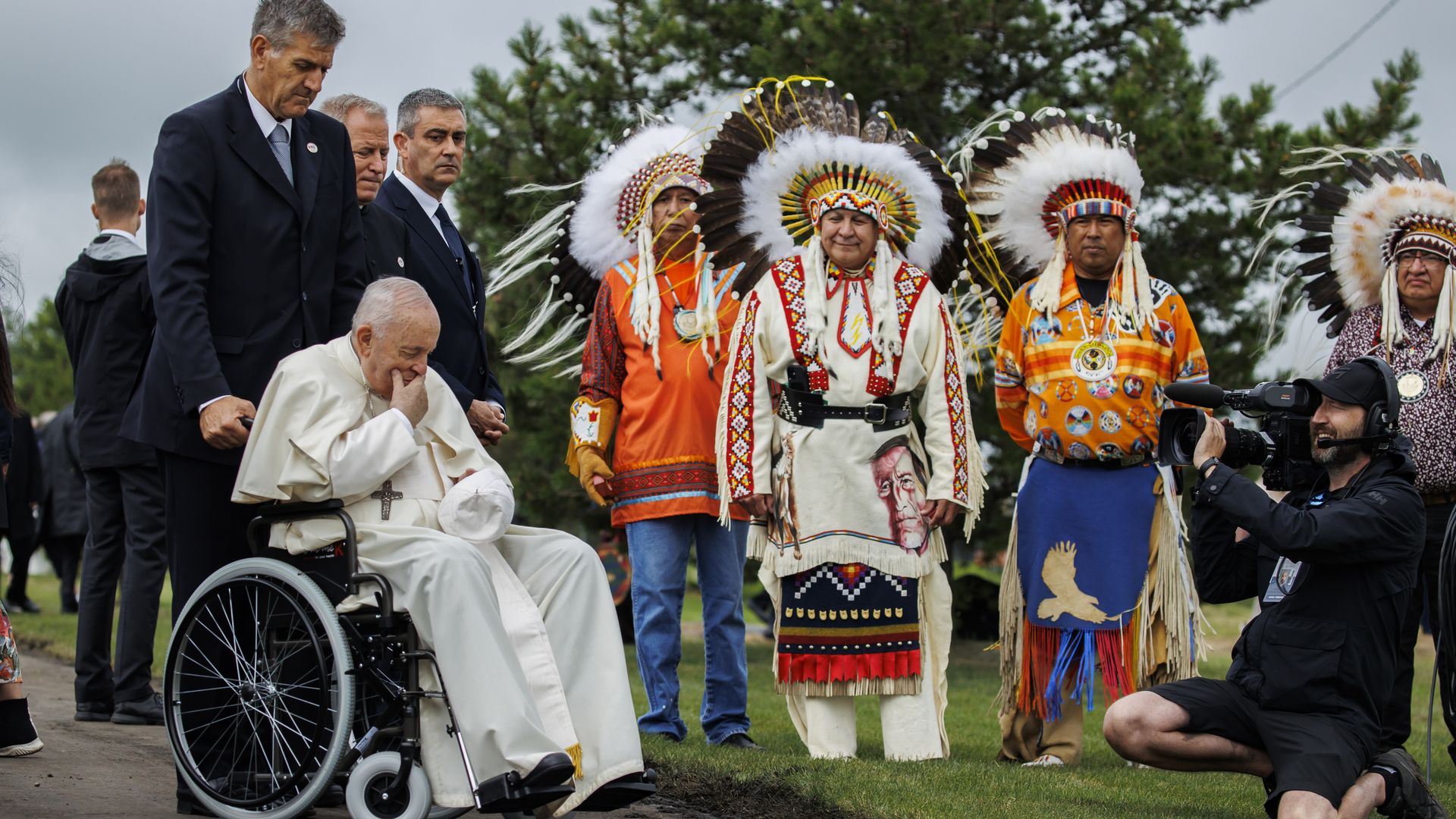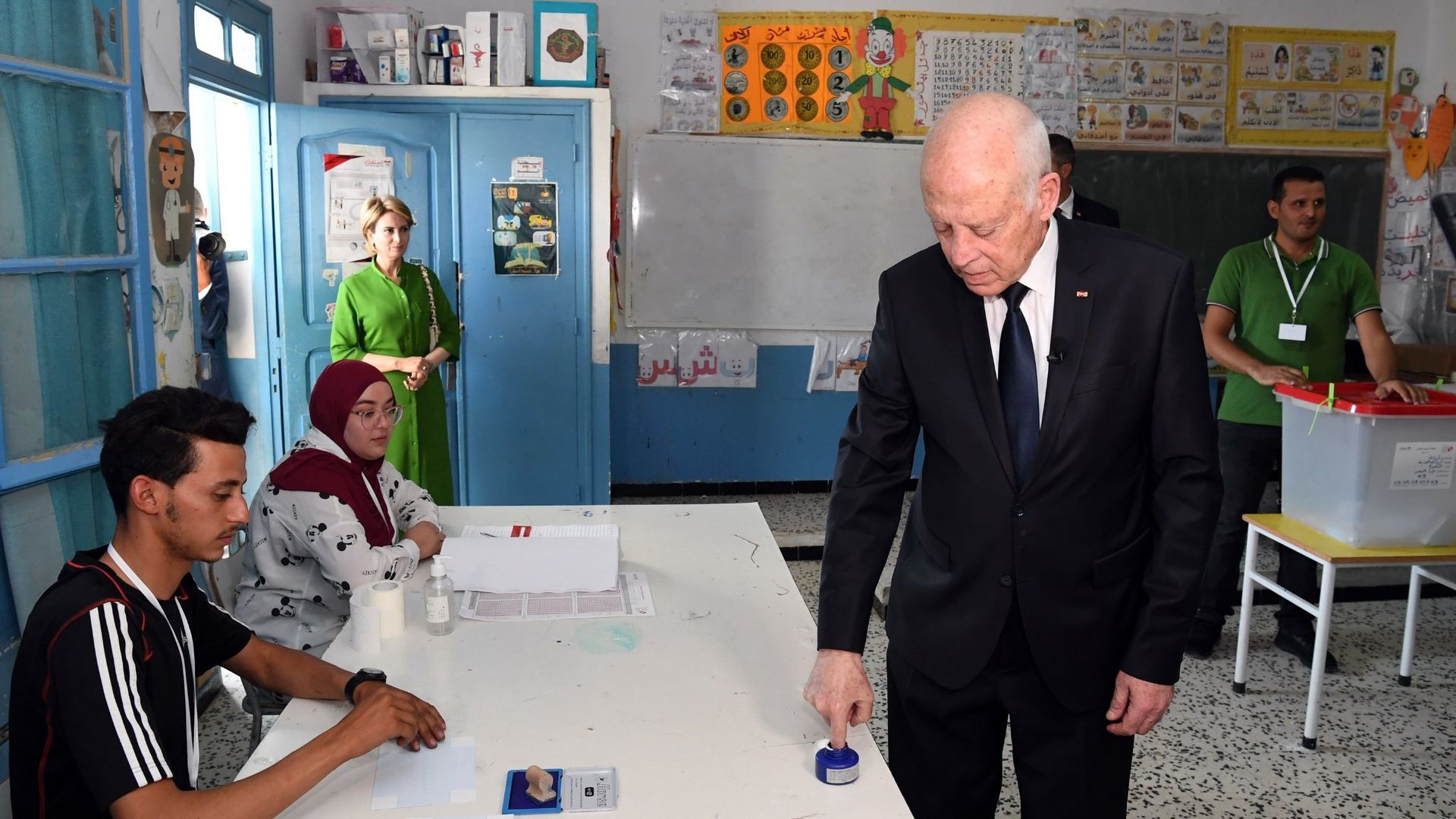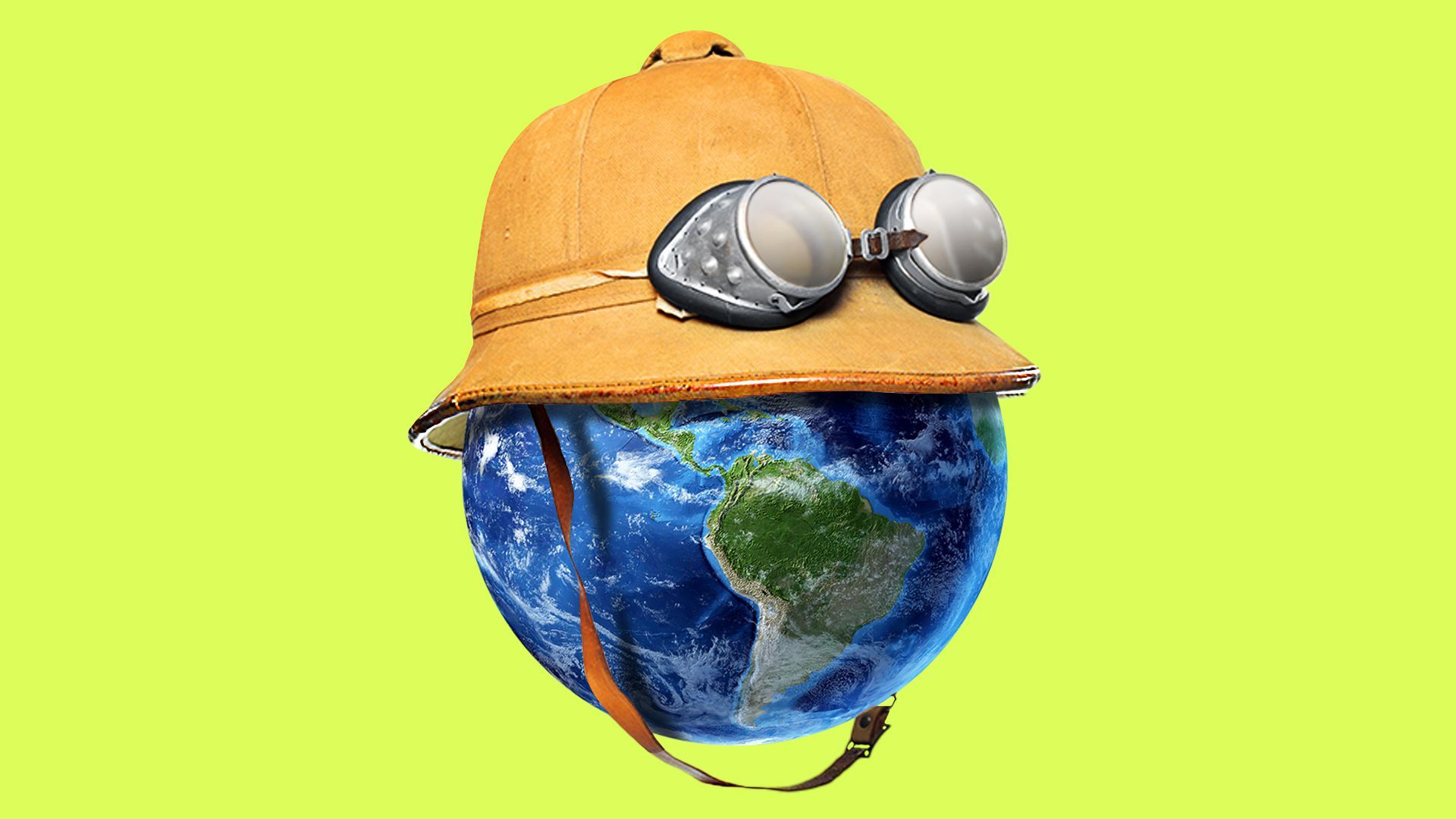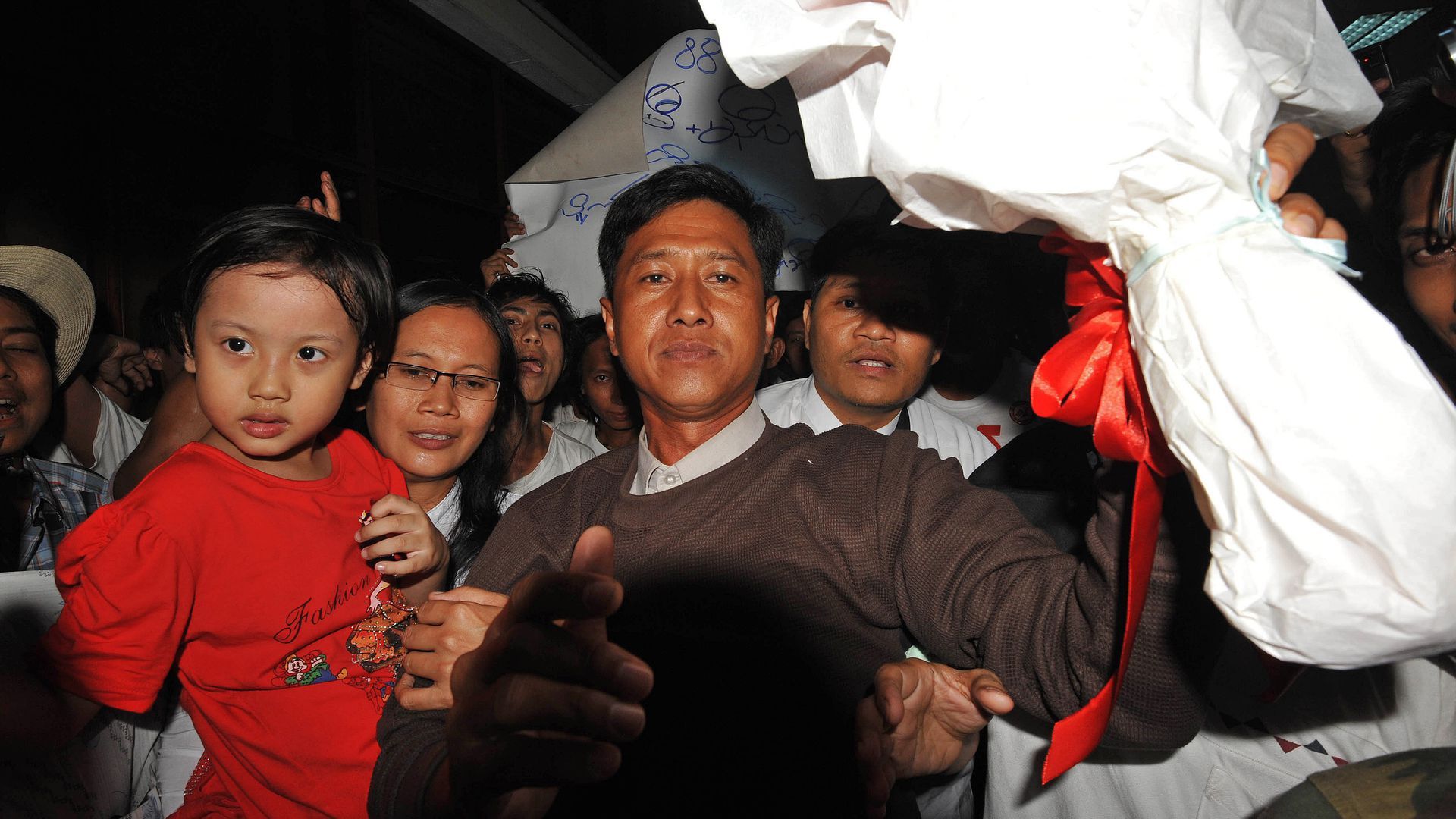| |
| |
| |
| |
| |
| Axios World |
| By Dave Lawler · Jul 25, 2022 |
| Welcome back to Axios World. - Hope you enjoyed the weekend. We start tonight (1,723 words, 6 minutes) in Canada, with an apology from Pope Francis.
New arrival? Subscribe. |
| |
| |
| 1 big thing: Pope begs forgiveness for abuse of Indigenous children |
 |
|
| Pope Francis pauses at the former site of Ermineskin Residential School. Photo: Cole Burston/Getty Images |
| |
| Pope Francis began a weeklong "penitential pilgrimage" in Canada today by apologizing for the "evil committed by so many Christians" against Indigenous children. Why it matters: Between 1883 and 1996, roughly 150,000 children were forced into schools that were designed to shed them of their language of culture, and which Canada's Truth and Reconciliation Commission has described as "cultural genocide." Tens of thousands were abused. - This is the first trip of Francis' tenure designed entirely around reconciliation for the Church's historic sins.
- The abuses from the residential schools — which were funded by the Canadian government and administered by Christian organizations, roughly half of which were Catholic — aren't so far in the past.
- Children were being forcibly taken from their families as recently as the 1960s, and the last school didn't close until 1998. There were survivors on hand for the pope's remarks today.
What they're saying: "I humbly beg forgiveness," the pope said, speaking at a former school in Alberta. "It is painful to think of how the firm soil of values, language and culture that made up the authentic identity of your peoples was eroded. That you have continued to pay the price of this." - He called for "a serious investigation into the facts of what took place."
- The reaction was mixed, with some of those in attendance applauding, others crying and still others remaining silent, per AP.
- "I've waited 50 years for this apology, and finally today I heard it," survivor Evelyn Korkmaz told AP. "Part of me is rejoiced, part of me is sad, part of me is numb."
- Other survivors wanted more specifics about what Francis was apologizing for or what the Church planned to do about it. "When he talks about the atrocities that the churches did on our people, he didn't use the word 'sexual abuse," survivor Ruth Roulette told Reuters. "That's what happened."
The system of boarding schools was nominally intended to "civilize" Indigenous children, who often weren't allowed to use their names, communicate with their families or speak their own languages. - Many were subjected to sexual abuse, malnourishment and forced labor.
- Pope Francis lamented the "colonizing mentality" of those who "oppressed the Indigenous peoples," and called the policy a "disastrous error."
What's next: The 85-year-old pontiff, who has been using a wheelchair and has had to scale back his travel due to torn knee ligaments, will hold an open-air mass tomorrow in Edmonton before stops in Quebec and Iqaluit in the Canadian Arctic, where he'll visit another former residential school on Friday. |
    |
| |
| |
| 2. While touring Africa, Lavrov blames the West for food crisis |
 |
|
| Sergei Lavrov in Cairo. Photo: Mohamed Abdel Hamid/Anadolu Agency via Getty |
| |
| Russian Foreign Minister Sergei Lavrov is on a tour of African capitals, making the case that Moscow is not the aggressor in Ukraine nor the cause of the resulting food crisis, which has hit the continent hard. Driving the news: Lavrov was in Republic of Congo today and will visit Uganda Tuesday and Ethiopia on Wednesday, where he'll also hold meetings at African Union headquarters. Ahead this week's visit, Lavrov penned a column praising African countries for rejecting sanctions on Russia and resisting Western efforts to "impose a unipolar world order." - Lavrov also harkened back to Soviet-era support for decolonization struggles in Africa.
- Today, Russia is the continent's top supplier of arms and has good relations with many African countries, including some regimes with which the U.S. is reluctant to deal.
Zoom in: Uganda was one of 25 African countries to abstain on the UN resolution condemning Russia in the wake of the invasion, and longtime President Yoweri Museveni said recently that it was best to keep the government's views "private." - Yes, but: Gen. Muhoozi Kainerugaba, Museveni's son and likely political heir, tweeted that Vladimir Putin was "absolutely right" to invade.
- The latest: Uganda's state broadcaster has announced it will now run news bulletins from RT twice a day, per Reuters.
Worth noting: French President Emmanuel Macron will be in West Africa this week, while U.S. special envoy for the Horn of Africa Mike Hammer will also visit Egypt and Ethiopia. |
    |
| |
| |
| 3. Tunisia's referendum could be the death blow for democracy |
 |
|
| President Kais Saied votes. Photo: Tunisian Presidency Handout via Getty |
| |
| Today's constitutional referendum in Tunisia is on course to cement President Kais Saied's hold on nearly all levers of power and, critics fear, end the country's decade-long experiment with democracy. The latest: An exit poll from Sigma Conseil shows 92% support for the changes on 25% turnout. Most opposition parties boycotted, but there is no minimum threshold for the results to be binding. The big picture: Tunisia was the birthplace of the Arab Spring and the only democracy to emerge from it. - But enthusiasm for democracy declined over time amid government dysfunction, corruption and economic travails. When Saied unilaterally dismissed the government one year ago and began ruling by decree, many Tunisians welcomed it.
- However, some have been alarmed not only at the powers the new constitution would hand the president, but also at Saied's control over the speedy constitutional rewrite and the voting process.
Flashback: Saied was a professor of constitutional law before running for president in 2019. He projects an austere lifestyle and sympathy for the poor, and he claims the new constitution is required to save the 2011 revolution. What to watch: The sentiment that democracy simply isn't delivering exists far beyond Tunisia, as Pew polling has shown, and it could be exacerbated by the current economic chaos around the world. - Global democracy has already been in decline for 16 years, according to Freedom House. That seems likely to continue.
|
    |
| |
| |
| A message from Axios |
| The news you need in 10 minutes. |
| |
 |
| |
| Catch up on the biggest stories of the day and why they matter with the Axios Today podcast. Host Niala Boodhoo is joined by journalists from Axios' newsroom to unpack the stories shaping your world and the trends shaping our time. Listen for free. |
| |
| |
| Bonus: Where in the world? |
 |
|
| Illustration: Natalie Peeples/Axios |
| |
| I have another puzzle for you today. How it works: I give you a clue and the number of countries still remaining. Can you name the two countries to which all five clues apply? - Formerly part of the British Empire (65 countries left).
- Northern Hemisphere (47 countries left).
- Founding member of the UN (5 countries).
- Note: With a few exceptions, a country had to be independent by 1945 to become a founding member of the UN.
- Major oil producer (3 countries).
- Not the U.S., but has been invaded by it* (2 countries).
*In one of these cases, the U.S. invaded while the country was still a British colony. Scroll to the bottom for the answers. |
    |
| |
| |
| 4. Global news roundup |
 |
|
| Myanmar activist Kyaw Min Yu (center) was among those executed. Photo: Soe Than Win/AFP via Getty Images |
| |
| 1. Myanmar's military junta executed four democracy activists, including a former lawmaker from Aung San Suu Kyi's party in the first judicial executions in Myanmar since 1988. 2. Brazilian President Jair Bolsonaro officially launched his re-election bid on Sunday, assuring supporters that "The army is on our side." - Bolsonaro trails former president Luiz Inácio Lula da Silva in the polls, though the gap has been narrowing. He has been baselessly claiming the results will be illegitimate if electronic voting is used.
3. The WHO declared on Saturday that monkeypox, which has spread to more than 70 countries, is a global emergency. 4. Hungarian Prime Minister Viktor Orbán said Saturday that Hungarians "do not want to become peoples of mixed race" and multicultural European countries are no longer true nations. 5. U.S. Ambassador to Australia Caroline Kennedy and Deputy Secretary of State Wendy Sherman will visit the Solomon Islands in early August for a commemoration of the Battle of Guadalcanal, in which both their fathers fought. - Between the lines: The Solomon Islands recently signed a security pact with China, and it's been attracting quite a bit of U.S. diplomatic attention as a result.
Worth reading: - The WSJ's Rory Jones got some details on the Saudi crown prince's trillion-dollar plans to build a horizontal city through the desert. It's truly wild.
|
    |
| |
| |
| 5. View from Taiwan: China's threats shouldn't deter Pelosi trip |
 |
|
| Photo: Kent Nishimura/Los Angeles Times via Getty Images |
| |
| TAIPEI, Taiwan — Threats from China shouldn't stop U.S. House Speaker Nancy Pelosi from visiting Taiwan, analysts on the self-governing island told Axios' Bethany Allen-Ebrahimian, who is now based in Taipei. Catch up quick: President Biden said the U.S. military thinks the still-unconfirmed trip is "not a good idea right now." The Chinese Foreign Ministry threatened "forceful measures" if it goes ahead. - Pelosi said last week that she believes "it's important for us to show support for Taiwan." Republican Sen. Ben Sasse is among those calling on her to go, no matter what Beijing says.
What they're saying: In Taiwan, analysts and policymakers have welcomed news of Pelosi's possible trip. - "Fear of Chinese retaliation should not dictate engagements between partners," said Enoch Wu, founder of the Taipei-based security and defense think tank Forward Alliance.
- "It would be a very positive step forward in building up our relationships ... and a symbol of how strong the U.S.-Taiwan relationship is," said Vincent Chao, who previously directed the political division of Taiwan's de facto embassy in Washington.
Between the lines: The news of Pelosi's potential visit comes at a sensitive time for China, as the ruling Chinese Communist Party is preparing for a national Party congress held only once every five years. |
    |
| |
| |
| 6. What I'm reading: Opening the Congo for drilling |
 |
|
| Rain forest canopy in central DRC. Photo: Avalon/Universal Images Group via Getty |
| |
| In order to become "the new destination for oil investments," the Democratic Republic of Congo plans to auction off vast swaths of its rainforests and peatlands — some of the world's most precious carbon sinks — for exploration, Ruth Maclean and Dionne Searcey write in the NYT. This is another jarring example of global momentum on climate action slipping into reverse. - Flashback: DRC President Félix Tshisekedi "stood alongside world leaders at the global climate summit in Glasgow [last fall] and endorsed a 10-year agreement to protect its rainforest."
- Now, government climate adviser Tosi Mpanu Mpanu tells the Times the plan is to drill a path to greater prosperity.
The big picture: Rich countries are seeking to increase oil production. President Biden's climate agenda is "largely doomed." Plans to pay developing countries not to take the sorts of steps DRC has announced have received far less attention (or funding). What to watch: Mpanu said the government had noted the recent global developments and denied DRC was bluffing to gain more financial assistance to protect its forests. "Our priority is not to save the planet." Read the piece. |
    |
| |
| |
| 7. Stories we're watching |
 |
|
| Flooded streets of Hyderabad, Pakistan. Photo: Akram Shahid/AFP via Getty |
| |
- Greenland ice melt kicks into high gear.
- Europe's surging electricity prices shatter records.
- U.S. ID's 2 Americans killed in Ukraine.
- U.S. to send Ukraine another $270 million in arms.
- Moldova fears Russian invasion.
- UN court rejects Myanmar's objections to Rohingya genocide case.
- Chinese military "noticeably more aggressive," Gen. Milley warns.
Quoted: "I will not come to your defense." — Donald Trump claimed Sunday that that's what he told NATO members who "didn't pay" if they were attacked by Russia. |
    |
| |
| |
| A message from Axios |
| The news you need in 10 minutes. |
| |
 |
| |
| Catch up on the biggest stories of the day and why they matter with the Axios Today podcast. Host Niala Boodhoo is joined by journalists from Axios' newsroom to unpack the stories shaping your world and the trends shaping our time. Listen for free. |
| |
| Answers: Canada and Iraq. The U.S. invaded Canada during the War of 1812. |
 | | Are you a fan of this email format? It's called Smart Brevity®. Over 300 orgs use it — in a tool called Axios HQ — to drive productivity with clearer workplace communications. | | |












No comments:
Post a Comment